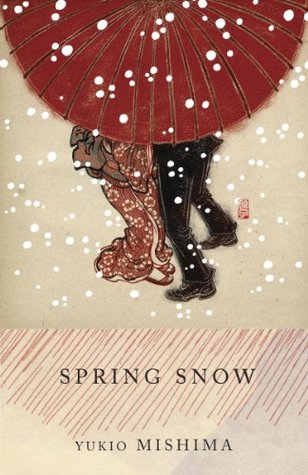More on this book
Community
Kindle Notes & Highlights
Kiyoaki Matsugae asked his closest friend, Shigekuni Honda,
The year the war ended they had both been eleven,
Two members of the Matsugae family, Kiyoaki’s uncles, had been killed.
“Vicinity of Tokuri Temple: Memorial Services for the War Dead” and dated June 26, 1904, the thirty-seventh year of the Meiji era.
Both its age and its sepia ink tinged the photograph with an atmosphere of infinite poignance.
Kiyoaki was eighteen.
Kiyoaki’s father, Marquis Matsugae,
embarrassed by the humble position his forebears had occupied as recently as the end of the shogunate fifty years before, had sent the boy, still a very small child, to be brought up in the household of a court nobleman. Had he not done so, Kiyoaki would probably not have developed into so sensitive a young man.
Some two hundred stone lanterns were scattered at random along the banks and on the island, which also boasted three cranes made out of cast-iron, two stretching their long necks to the sky and the other with its head bent low.
When Kiyoaki was a child, the servants had frightened him with stories about the snapping turtles.
the other climbed a small hill to the plateau at its top where a shrine stood at one corner of a wide expanse of grass. This was where his grandfather and two uncles were enshrined.
Somewhat lower down there was a shrine to Inari, the harvest god,
The anniversary of his grandfather’s death fell at the end of May; thus the wisteria was always in full glory when the family gathered here for the services,
Kiyoaki was praised for his extraordinary beauty.
Princess Kasuga, however, was not much more than thirty. Beautiful, elegant, imposing, she was like a flower at its moment of perfection.
thirteen, Kiyoaki was altogether too handsome.
Marquis Matsugae
His elegance was the thorn. And he was well aware that his aversion to coarseness, his delight in refinement, were futile; he was a plant without roots. Without meaning to undermine his family, without wanting to violate its traditions, he was condemned to do so by his very nature. And this poison would stunt his own life as it destroyed his family. The handsome young man felt that this futility typified his existence.
Although they were the same age, Honda was more mature.
The very night before, he had dreamed of his own coffin, made of unpainted wood.
“Oh, it’s Satoko. Did I never show you her picture?”
“Her? Oh yes; that’s Satoko’s great-aunt, the Abbess of Gesshu.
His father’s mistress was installed in one of the houses just outside the gate.
Siamese princes
Marquise Matsugae,
In his youth, his father had spent some years studying law in Germany, and he revered the German respect for logic.
Although the Matsugaes seemed to lead a Westernized life and although their house was filled with objects from abroad, the atmosphere of their home was strikingly and traditionally Japanese.
In his own household, on the other hand, the day-today life-style might be Japanese, but the atmosphere had much that was Western in spirit.
As usual, once he had finished his homework, which tonight was French, his second foreign language,
Prince Pattanadid,
Kridsada
Kiyoaki picked out Satoko where she sat beside her old servant, Tadeshina.
Chao P.
KIYOAKI’S TUTOR IINUMA
Okura hakama,
Kiyoaki was caught by the supple strength of her neck. It made him think of the smooth, white neck of a swan.
Beneath the bottom of the green blanket, the toe of a woman’s white tabi edged out timidly, like a nervous white mouse peeping out of its grassy burrow.
The old desk, with its scars under the new varnish, reflected the direct glare of the snow through the window. It made him think of an upright coffin draped in white, the kind used to bury ancient warriors in a sitting position.
Kiyoaki was not sure where this was taking Honda, but as he listened, a germ of thought began to grow in his mind.
“In other words, no matter what we think, or hope for, or feel—all that has not the slightest bearing on the course of history? Is that what you mean?”
BARON SHINKAWA and his wife were uniquely matched as a couple:
The Shinkawas were an old and wealthy merchant family,
Prince Toin
“When the Marquis was studying in Europe, he took to foreign ways. Before that he kept his mistress in the same house as his wife, but afterwards he installed her in a rented house just outside the front gate, which is about half a mile from the house.
“As to animals,” said the Count unexpectedly, “whatever one says, I maintain that the rodent family has a certain charm about it.”
“Well, sir, in the first place, they seem to have been ignored by the poets, d’you see. And what has no place in a poem has no place in my house. That’s my family rule.”
PRINCE HARUNORI, the third son of His Imperial Highness Prince Toin,
Satoko Ayakura
The Toinnomiya villa, a palatial Western-style house,
Count Ayakura,


